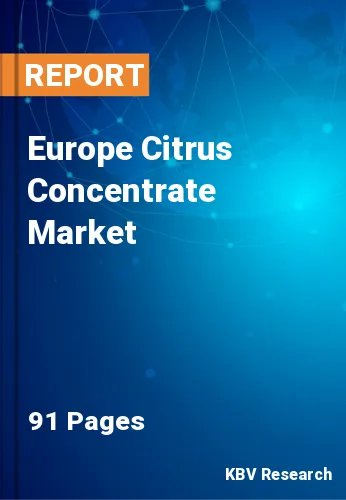The Europe Citrus Concentrate Market would witness market growth of 4.6% CAGR during the forecast period (2022-2028).
The water is taken out of freshly squeezed fruit and vegetable juice to create fruit juice concentrate. Typically, it serves as the foundation stock for various culinary items. It has soluble solids between 65% and 70% of the volume. The method of making fruit juice concentrate is an efficient approach to saving costs associated with shipping and packaging. Moreover, it ensures the consistent quality of finished goods. The rise in acid and sugar concentration, however, is in favor of preservation.
The best concentration technique must be chosen; hence the quality must come first. After being diluted, a qualified fruit juice concentrate must still have the same color, taste, and nutritional value as the original fruit juice. In this sense, a low temperature is required for the concentration process. The vacuum concentrate technique, refrigeration-based concentration, and membrane-based concentration are the three most used fruit juice processing technologies. In addition, scent recovery is a crucial phase in juice concentration that one cannot skip.
The third-largest industry in Germany is the food processing sector. Germany produced processed food and beverages worth an estimated 221.7 billion USD in 2019. The size of the food and beverage industry in Germany is anticipated to rise rapidly over the next several years due to growing disposable incomes, population expansion, and the introduction of new products and trends. Substantial development in the food and beverage business is due to the rise in eateries, fast-food chains, and meal delivery services. The constant growth of food and beverage products joined with the rising health consciousness among the citizens, is expected to surge the popularity of citrus concentrate products and boost the market growth in the region.
The Germany market dominated the Europe Citrus Concentrate Market by Country in 2021, and would continue to be a dominant market till 2028; thereby, achieving a market value of $864.2 million by 2028. The UK market is anticipated to grow at a CAGR of 3.8% during (2022 - 2028). Additionally, The France market would exhibit a CAGR of 5.4% during (2022 - 2028).
Based on Nature, the market is segmented into Conventional, and Organic. Based on Source, the market is segmented into Oranges, Tangerines, Lemon & Limes, Grapefruits, and Others. Based on Form, the market is segmented into Liquid, and Dry. Based on Sales Channel, the market is segmented into B2B, and B2C. Based on End-use, the market is segmented into Food & Beverages, Pharmaceuticals, Nutraceuticals, and Others. Based on countries, the market is segmented into Germany, UK, France, Russia, Spain, Italy, and Rest of Europe.
Free Valuable Insights: The Global Citrus Concentrate Market will Hit $10.8 Billion by 2028, at a CAGR of 5.2%
The market research report covers the analysis of key stake holders of the market. Key companies profiled in the report include Döhler Gmbh, IPRONA SPA, Louis Dreyfus Company B.V., SunOpta, Inc, Kiril Mischeff Limited, Vinayak Ingredients (INDIA) Pvt. Ltd., Asia Farm F&B Pte Ltd, Citrus Systems, Inc., Prodalim B.V., and El-Marwa Food Industries Co.
By Nature
By Source
By Form
By Sales Channel
By End User
By Country
Our team of dedicated experts can provide you with attractive expansion opportunities for your business.

